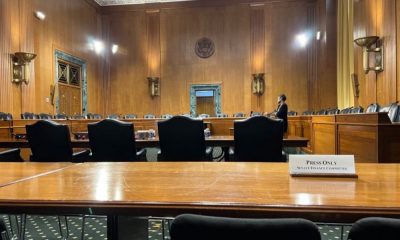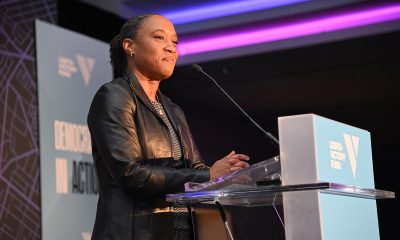National
Parker’s win hailed as major breakthrough
Gay rights advocates are heralding the victory of a lesbian official in her bid to become mayor of Houston as a triumph for LGBT Americans.
Annise Parker, a Democrat and city controller for Houston, won the city’s Dec. 12 mayoral election by taking 53 percent of the vote. Her win marks the seventh time she’s won a citywide election in Houston and makes the city the most populous in the country to elect an openly LGBT mayor. She takes office Jan. 4.
Paul Scott, executive director for Equality Texas, said Parker’s victory has “multi-layered” significance.
“I think in some ways, we’ve seen the ceiling being broken, not only within the Houston area and Texas, but also nationally in terms of an open lesbian being elected into the highest-level office in the metropolitan area for the fourth largest city in the country,” he said.
Chuck Wolfe, president of the Gay & Lesbian Victory Fund, which endorsed Parker in her race, said the win demonstrates LGBT people “are ready to step up and lead.”
“The voters of Houston have come to realize that sexual orientation is not an indicator of somebody’s ability to do a job,” he said.
Noting that Parker would be expected to testify before the Texas Legislature, Wolfe predicted her role would impact how state lawmakers view LGBT issues.
“When she is in Austin at the state capital — and testifying as the mayor of the largest city in Texas — those state legislators are not going to be able to use sexual orientation as a wedge when they realize they need the support of the largest city in Texas,” he said.
Scott said Parker’s election also could have a direct impact on the 2010 congressional and state House races in the Houston area and would prompt candidates seeking election to look more favorably on LGBT issues.
“As a result, we see this as a positive impact in terms of not only GLBT candidates being evaluated for their qualifications, but those who support GLBT issues also knowing that their stance on these issues does not have to be detrimental to their campaigns,” he said.
A longtime public official in Houston, Parker was first elected as Houston’s city controller in 2003, and before that served as a Houston City Council member since 1997.
In an interview Monday on MSNBC, Parker said she won because she’s truthful to her constituents.
“I’ve always been completely honest with the voters of Houston — whether [it’s] about my sexual orientation, whether it’s about the fact that my life partner of 19 years and I have multi-racial kids that we’ve adopted,” she said. “They know me, they trust me, they know I’ll tell them the truth, and in this economy, when there’s a lot of uncertainty, you want someone that you know you can depend on.”
She also is no stranger to fighting for LGBT rights, and campaigned against repeal of Houston’s non-discrimination policy in 1985 and passage of a constitutional ban on same-sex marriage in Texas in 2005. As a city council member, she led an effort to pass an ordinance to reinstate Houston’s non-discrimination policy in 2001.
Asked by MSNBC whether LGBT rights would be a priority for her as mayor, Parker responded that’s “part of a hard conversation I had with supporters in the LGBT community.”
“I’ve been a role model and a hard worker for my community for more than 30 years, but in that conversation, I was very frank, and said, ‘My focus as mayor of Houston will be the financial issues of the city, trying to make Houston the best city it can be in dealing with those problems,’” she said.
Parker told MSNBC she assumes Houston will revisit the issue of providing domestic partner benefits to LGBT city workers, but said she doesn’t intend to make this effort a priority.
“It is not something I intend to initiate,” she said. “My focus is what is best for all the citizens of Houston.”
With Parker acknowledging she’s a role model for the LGBT community, Wolfe said her win could encourage other LGBT people to become public about their sexual orientation or gender identity and seek public office.
“I think the ability for other people interested in government — whether they are the young people in student government, whether they are closeted people in business who’ve thought about [how] they want to be involved and whether they should come out … I think that role model position she is in is significant,” he said.
The campaign wasn’t free of anti-gay smears. A mailing sent out earlier this month urged voters to reject Parker and other gay candidates because they were “endorsed by the gay and lesbian political action committee,” an apparent reference to Houston’s Gay Lesbian Bisexual Transgender Political Caucus, according to the Houston Chronicle.
The Chronicle reported earlier this month that the finance chair and finance committee chair for Parker’s opponent in the election, Democrat Gene Locke, helped bankroll the political action committee that sent out the mailings. The Locke campaign denied the financial contributions were part of any kind of illegal coordination, according to the Chronicle.
Wolfe said Parker’s ability to win despite the mailings shows that employing divisive anti-gay politics in campaigns doesn’t work and is “starting to have the opposite effect.”
In her MSNBC interview, Parker addressed the anti-gay smears.
“The fact that I used to be — or was a very public gay activist is part of my political resume,” she said. “Voters knew that, they were reminded of it in a very negative way in the last two weeks of the campaign, but they chose to focus on the fact that they knew me and done good work for them, I believe.”
National
Same-sex couples vulnerable to adverse effects of climate change
Williams Institute report based on Census, federal agencies

A new report by the Williams Institute at the UCLA School of Law finds that same-sex couples are at greater risk of experiencing the adverse effects of climate change compared to different-sex couples.
LGBTQ people in same-sex couple households disproportionately live in coastal areas and cities and areas with poorer infrastructure and less access to resources, making them more vulnerable to climate hazards.
Using U.S. Census data and climate risk assessment data from NASA and the Federal Emergency Management Agency, researchers conducted a geographic analysis to assess the climate risk impacting same-sex couples. NASA’s risk assessment focuses on changes to meteorological patterns, infrastructure and built environment, and the presence of at-risk populations. FEMA’s assessment focuses on changes in the occurrence of severe weather events, accounting for at-risk populations, the availability of services, and access to resources.
Results show counties with a higher proportion of same-sex couples are, on average, at increased risk from environmental, infrastructure, and social vulnerabilities due to climate change.
“Given the disparate impact of climate change on LGBTQ populations, climate change policies, including disaster preparedness, response, and recovery plans, must address the specific needs and vulnerabilities facing LGBTQ people,” said study co-author Ari Shaw, senior fellow and director of international programs at the Williams Institute. “Policies should focus on mitigating discriminatory housing and urban development practices, making shelters safe spaces for LGBT people, and ensuring that relief aid reaches displaced LGBTQ individuals and families.”
“Factors underlying the geographic vulnerability are crucial to understanding why same-sex couples are threatened by climate change and whether the findings in our study apply to the broader LGBTQ population,” said study co-author Lindsay Mahowald, research data analyst at the Williams Institute. “More research is needed to examine how disparities in housing, employment, and health care among LGBT people compound the geographic vulnerabilities to climate change.”
Read the report
Federal Government
Lambda Legal praises Biden-Harris administration’s finalized Title IX regulations
New rules to take effect Aug. 1

The Biden-Harris administration’s revised Title IX policy “protects LGBTQ+ students from discrimination and other abuse,” Lambda Legal said in a statement praising the U.S. Department of Education’s issuance of the final rule on Friday.
Slated to take effect on Aug. 1, the new regulations constitute an expansion of the 1972 Title IX civil rights law, which prohibits sex-based discrimination in education programs that receive federal funding.
Pursuant to the U.S. Supreme Court’s ruling in the landmark 2020 Bostock v. Clayton County case, the department’s revised policy clarifies that discrimination on the basis of sexual orientation and gender identity constitutes sex-based discrimination as defined under the law.
“These regulations make it crystal clear that everyone can access schools that are safe, welcoming and that respect their rights,” Education Secretary Miguel Cardona said during a call with reporters on Thursday.
While the new rule does not provide guidance on whether schools must allow transgender students to play on sports teams corresponding with their gender identity to comply with Title IX, the question is addressed in a separate rule proposed by the agency in April.
The administration’s new policy also reverses some Trump-era Title IX rules governing how schools must respond to reports of sexual harassment and sexual assault, which were widely seen as imbalanced in favor of the accused.
Jennifer Klein, the director of the White House Gender Policy Council, said during Thursday’s call that the department sought to strike a balance with respect to these issues, “reaffirming our longstanding commitment to fundamental fairness.”
“We applaud the Biden administration’s action to rescind the legally unsound, cruel, and dangerous sexual harassment and assault rule of the previous administration,” Lambda Legal Nonbinary and Transgender Rights Project Director Sasha Buchert said in the group’s statement on Friday.
“Today’s rule instead appropriately underscores that Title IX’s civil rights protections clearly cover LGBTQ+ students, as well as survivors and pregnant and parenting students across race and gender identity,” she said. “Schools must be places where students can learn and thrive free of harassment, discrimination, and other abuse.”
Michigan
Mich. Democrats spar over LGBTQ-inclusive hate crimes law
Lawmakers disagree on just what kind of statute to pass

Michigan could soon become the latest state to pass an LGBTQ-inclusive hate crime law, but the state’s Democratic lawmakers disagree on just what kind of law they should pass.
Currently, Michigan’s Ethnic Intimidation Act only offers limited protections to victims of crime motivated by their “race, color, religion, gender, or national origin.” Bills proposed by Democratic lawmakers expand the list to include “actual or perceived race, color, religion, gender, sexual orientation, gender identity or expression, ethnicity, physical or mental disability, age, national origin, or association or affiliation with any such individuals.”
Democratic Gov. Gretchen Whitmer and Attorney General Dana Nessel have both advocated for a hate crime law, but house and senate Democrats have each passed different hate crimes packages, and Nessel has blasted both as being too weak.
Under the house proposal that passed last year (House Bill 4474), a first offense would be punishable with a $2,000 fine, up to two years in prison, or both. Penalties double for a second offense, and if a gun or other dangerous weapons is involved, the maximum penalty is six years in prison and a fine of $7,500.
But that proposal stalled when it reached the senate, after far-right news outlets and Fox News reported misinformation that the bill only protected LGBTQ people and would make misgendering a trans person a crime. State Rep. Noah Arbit, the bill’s sponsor, was also made the subject of a recall effort, which ultimately failed.
Arbit submitted a new version of the bill (House Bill 5288) that added sections clarifying that misgendering a person, “intentionally or unintentionally” is not a hate crime, although the latest version (House Bill 5400) of the bill omits this language.
That bill has since stalled in a house committee, in part because the Democrats lost their house majority last November, when two Democratic representatives resigned after being elected mayors. The Democrats regained their house majority last night by winning two special elections.
Meanwhile, the senate passed a different package of hate crime bills sponsored by state Sen. Sylvia Santana (Senate Bill 600) in March that includes much lighter sentences, as well as a clause ensuring that misgendering a person is not a hate crime.
Under the senate bill, if the first offense is only a threat, it would be a misdemeanor punishable by one year in prison and up to $1,000 fine. A subsequent offense or first violent hate crime, including stalking, would be a felony that attracts double the punishment.
Multiple calls and emails from the Washington Blade to both Arbit and Santana requesting comment on the bills for this story went unanswered.
The attorney general’s office sent a statement to the Blade supporting stronger hate crime legislation.
“As a career prosecutor, [Nessel] has seen firsthand how the state’s weak Ethnic Intimidation Act (not updated since the late 1980’s) does not allow for meaningful law enforcement and court intervention before threats become violent and deadly, nor does it consider significant bases for bias. It is our hope that the legislature will pass robust, much-needed updates to this statute,” the statement says.
But Nessel, who has herself been the victim of racially motivated threats, has also blasted all of the bills presented by Democrats as not going far enough.
“Two years is nothing … Why not just give them a parking ticket?” Nessel told Bridge Michigan.
Nessel blames a bizarre alliance far-right and far-left forces that have doomed tougher laws.
“You have this confluence of forces on the far right … this insistence that the First Amendment protects this language, or that the Second Amendment protects the ability to possess firearms under almost any and all circumstances,” Nessel said. “But then you also have the far left that argues basically no one should go to jail or prison for any offense ever.”
The legislature did manage to pass an “institutional desecration” law last year that penalizes hate-motivated vandalism to churches, schools, museums, and community centers, and is LGBTQ-inclusive.
According to data from the U.S. Department of Justice, reported hate crime incidents have been skyrocketing, with attacks motivated by sexual orientation surging by 70 percent from 2020 to 2022, the last year for which data is available.
Twenty-two states, D.C., Puerto Rico, and the U.S. Virgin Islands have passed LGBTQ-inclusive hate crime laws. Another 11 states have hate crime laws that include protections for “sexual orientation” but not “gender identity.”
Michigan Democrats have advanced several key LGBTQ rights priorities since they took unified control of the legislature in 2023. A long-stalled comprehensive anti-discrimination law was passed last year, as did a conversion therapy ban. Last month the legislature updated family law to make surrogacy easier for all couples, including same-sex couples.
A bill to ban the “gay panic” defense has passed the state house and was due for a Senate committee hearing on Wednesday.
-

 District of Columbia4 days ago
District of Columbia4 days agoNew D.C. LGBTQ+ bar Crush set to open April 19
-

 District of Columbia5 days ago
District of Columbia5 days agoReenactment of first gay rights picket at White House draws interest of tourists
-

 Arizona5 days ago
Arizona5 days agoAriz. governor vetoes anti-transgender, Ten Commandments bill
-

 South America3 days ago
South America3 days agoDaniel Zamudio murderer’s parole request denied












